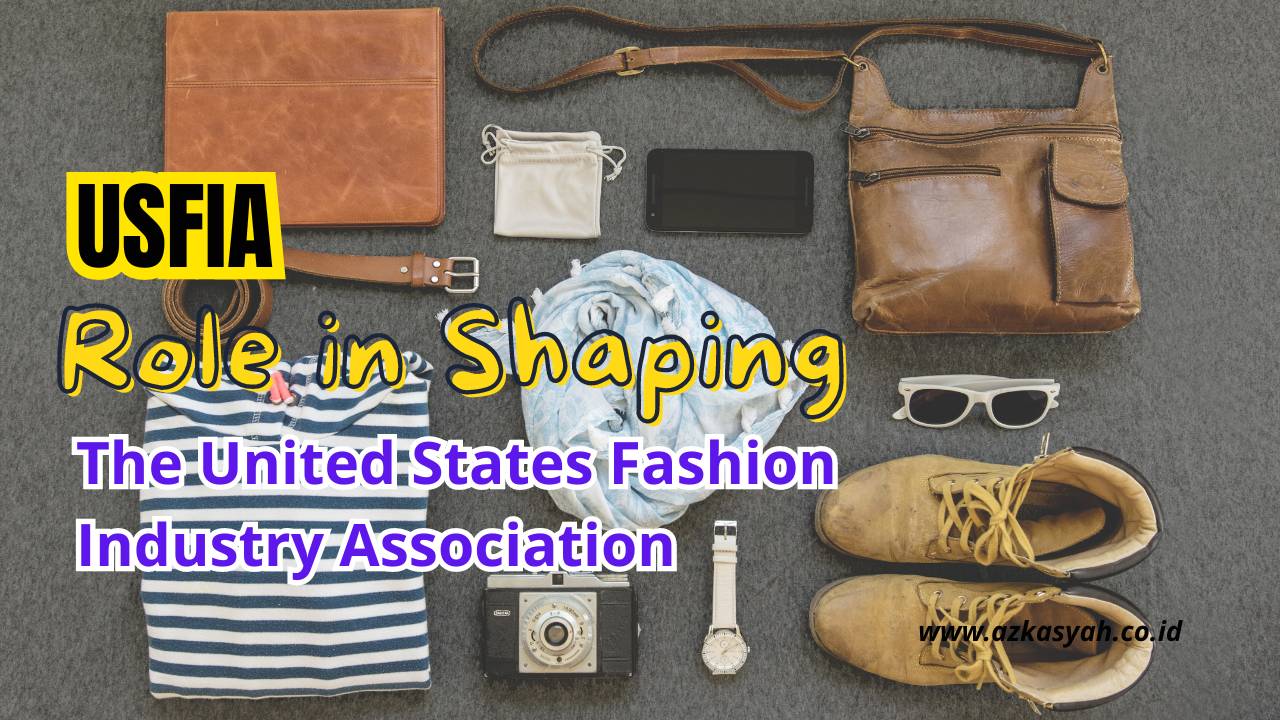The United States Fashion Industry Association (USFIA) is a pivotal organization that plays a significant role in shaping the future of the fashion industry, not only within the United States but also on a global scale. Founded with the mission of representing the interests of the U.S. fashion industry, the USFIA has become a leading voice in advocating for policies that support the industry’s growth, sustainability, and innovation. In this article, we will delve into the history, mission, and key functions of the USFIA, exploring how this organization influences trade, supports the industry’s evolution, and contributes to global fashion trends.
A Brief History of the USFIA
The United States Fashion Industry Association was established in the late 1980s, originally under the name the United States Association of Importers of Textiles and Apparel (USA-ITA). The organization was created in response to the increasing complexities of international trade regulations and the need for a unified voice to advocate for the interests of U.S. companies involved in the importation of textiles and apparel.
Over the years, the organization evolved, expanding its focus beyond imports to address a wider range of issues affecting the entire fashion supply chain. In 2013, the organization rebranded as the United States Fashion Industry Association USFIA to better reflect its broader scope and commitment to representing all segments of the fashion industry, from importers and retailers to designers and manufacturers.
The Mission of the USFIA
The USFIA’s mission is to create an environment that supports the growth and innovation of the U.S. fashion industry. This includes advocating for trade policies that are favorable to the industry, promoting sustainable practices, and providing educational resources to help businesses navigate the complex landscape of global trade.
Key aspects of the USFIA’s mission include:
- Advocacy: The USFIA actively engages with policymakers in Washington, D.C., and around the world to influence trade policies that benefit the fashion industry. This includes advocating for free trade agreements, opposing tariffs that could harm the industry, and promoting fair labor practices in the global supply chain.
- Education: The USFIA provides a wealth of educational resources to its members, including webinars, reports, and conferences. These resources help businesses stay informed about the latest trends in trade policy, sustainability, and innovation, ensuring they can make informed decisions in a rapidly changing industry.
- Sustainability: The USFIA is committed to promoting sustainability within the fashion industry. This includes advocating for policies that encourage environmentally friendly practices and supporting initiatives that reduce the industry’s carbon footprint.
The Role of USFIA in Trade Policy
One of the USFIA’s most significant roles is its involvement in shaping trade policy. The fashion industry is inherently global, with supply chains that span multiple countries and continents. As a result, trade policy has a profound impact on the industry, influencing everything from the cost of raw materials to the availability of finished products.
The USFIA works closely with government officials, both in the United States and abroad, to advocate for trade policies that support the industry’s growth. This includes pushing for free trade agreements that reduce tariffs and other barriers to trade, as well as opposing protectionist measures that could harm the industry.
For example, the USFIA has been a strong advocate for the African Growth and Opportunity Act (AGOA), which provides duty-free access to the U.S. market for textiles and apparel produced in eligible African countries. This program has been instrumental in supporting the development of the fashion industry in Africa, creating jobs and fostering economic growth in the region.
Promoting Fair Labor Practices
In addition to its work on trade policy, the USFIA is also committed to promoting fair labor practices within the fashion industry. The global nature of the industry means that many of the clothes and accessories sold in the United States are produced in countries with varying labor standards. The USFIA works to ensure that these products are made under fair and ethical conditions.
The organization supports initiatives such as the Alliance for Bangladesh Worker Safety, which was established in response to the tragic collapse of the Rana Plaza building in 2013. This initiative brings together retailers, manufacturers, and other stakeholders to improve working conditions in Bangladesh’s garment industry, ensuring that workers are treated fairly and work in safe environments.
The USFIA also collaborates with other organizations to promote the adoption of fair labor standards across the fashion industry. This includes supporting the use of certification programs that verify that products are made under fair labor conditions, as well as advocating for policies that encourage the use of ethically sourced materials.
Sustainability Initiatives
Sustainability is a growing concern in the fashion industry, and the USFIA is at the forefront of efforts to promote environmentally friendly practices. The organization recognizes that the fashion industry has a significant environmental impact, from the production of raw materials to the disposal of clothing. As such, the USFIA is committed to reducing this impact and promoting sustainability throughout the industry.
One of the ways the USFIA promotes sustainability is by advocating for policies that encourage the use of sustainable materials and production methods. This includes supporting initiatives such as the Better Cotton Initiative, which aims to make global cotton production better for the environment and the people who produce it.
The USFIA also works to raise awareness about the importance of sustainability within the fashion industry. This includes providing educational resources to its members on topics such as sustainable sourcing, circular fashion, and reducing waste. By promoting these practices, the USFIA helps businesses reduce their environmental footprint and meet the growing demand from consumers for sustainable fashion.
The USFIA’s Global Influence
While the USFIA is primarily focused on the U.S. fashion industry, its influence extends far beyond the country’s borders. The organization works closely with international trade organizations, foreign governments, and other stakeholders to promote the interests of the fashion industry on a global scale.
The USFIA’s involvement in international trade negotiations is a key part of its global influence. The organization regularly participates in trade missions and negotiations, advocating for policies that benefit the fashion industry. This includes working to ensure that trade agreements reflect the needs of the industry and that U.S. companies have access to international markets.
In addition to its work on trade policy, the USFIA also collaborates with other organizations around the world to promote best practices in the fashion industry. This includes sharing knowledge and resources with international partners, as well as supporting initiatives that promote fair labor practices and sustainability in other countries.
Educational Programs and Resources
One of the USFIA’s most valuable offerings is its educational programs and resources. The organization provides a wide range of tools to help its members stay informed about the latest developments in the fashion industry, from changes in trade policy to new sustainability initiatives.
The USFIA’s educational resources include:
- Webinars: The USFIA regularly hosts webinars on a variety of topics, including trade policy, sustainability, and innovation. These webinars feature industry experts and provide valuable insights for businesses looking to stay ahead of the curve.
- Reports: The USFIA publishes detailed reports on key issues affecting the fashion industry. These reports provide in-depth analysis and practical advice, helping businesses navigate the complexities of the global market.
- Conferences: The USFIA hosts conferences and events throughout the year, bringing together industry leaders to discuss the latest trends and challenges. These events provide valuable networking opportunities and allow members to share knowledge and best practices.
The Future of the USFIA and the Fashion Industry
As the fashion industry continues to evolve, the role of the USFIA will become increasingly important. The organization is well-positioned to help the industry navigate the challenges of the future, from changes in trade policy to the growing demand for sustainability.
One of the key challenges facing the industry is the need to balance growth with environmental sustainability. The fashion industry is a major contributor to global carbon emissions, and there is increasing pressure on companies to reduce their environmental impact. The USFIA will play a crucial role in helping businesses meet this challenge, advocating for policies that support sustainable practices and providing resources to help companies reduce their carbon footprint.
Another challenge facing the industry is the need to adapt to changing consumer preferences. Today’s consumers are more informed and more demanding than ever before, seeking out brands that align with their values. The USFIA will help businesses stay ahead of these trends, providing insights into consumer behavior and helping companies develop strategies to meet the evolving demands of the market.
In addition to these challenges, the fashion industry will also need to navigate the complexities of the global trade environment. Trade policies are constantly evolving, and businesses need to stay informed to remain competitive. The USFIA will continue to advocate for policies that support the industry’s growth, ensuring that U.S. companies have access to international markets and can compete on a global scale.
The United States Fashion Industry Association (USFIA) is a vital organization that plays a central role in the fashion industry. Through its advocacy, educational resources, and commitment to sustainability, the USFIA helps businesses navigate the complexities of the global market and stay ahead of industry trends. As the fashion industry continues to evolve, the USFIA will remain a key player, shaping the future of fashion both in the United States and around the world.



